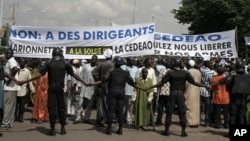International leaders meet Friday in Mali's capital to discuss ways of ousting al-Qaida-linked Islamist groups who control the country's north.
The meeting in Bamako will include representatives from the United Nations, West African bloc ECOWAS, the African Union and the European Union.
ECOWAS has proposed deploying a 3,000-strong military force to dislodge the militants but some Malians oppose foreign intervention and prefer taking a political approach.
Mali was plunged into chaos by a March 22 coup that toppled the president. The militants who seized the north have held public executions, amputations, and floggings in an effort to enforce their strict version of Islamic law.
Last week, the U.N. Security Council passed a resolution clearing the way for deployment of the ECOWAS force. The resolution gave African leaders 45 days to draw up a plan for military intervention.
Former colonial power France led the call for action on Mali in the Security Council and was a sponsor of the resolution. President Francois Hollande, speaking in Senegal last week, said the "horrors in northern Mali can't be tolerated."
Marches by hundreds of people in recent weeks in Bamako have highlighted splits in Malian public opinion, with some calling for swift foreign military intervention with others vehemently against it.
The meeting in Bamako will include representatives from the United Nations, West African bloc ECOWAS, the African Union and the European Union.
ECOWAS has proposed deploying a 3,000-strong military force to dislodge the militants but some Malians oppose foreign intervention and prefer taking a political approach.
Mali was plunged into chaos by a March 22 coup that toppled the president. The militants who seized the north have held public executions, amputations, and floggings in an effort to enforce their strict version of Islamic law.
Last week, the U.N. Security Council passed a resolution clearing the way for deployment of the ECOWAS force. The resolution gave African leaders 45 days to draw up a plan for military intervention.
Former colonial power France led the call for action on Mali in the Security Council and was a sponsor of the resolution. President Francois Hollande, speaking in Senegal last week, said the "horrors in northern Mali can't be tolerated."
Marches by hundreds of people in recent weeks in Bamako have highlighted splits in Malian public opinion, with some calling for swift foreign military intervention with others vehemently against it.





